人教版必修一Unit2Englisharoundtheworldperiod3Grammar语法
- 格式:ppt
- 大小:2.11 MB
- 文档页数:31
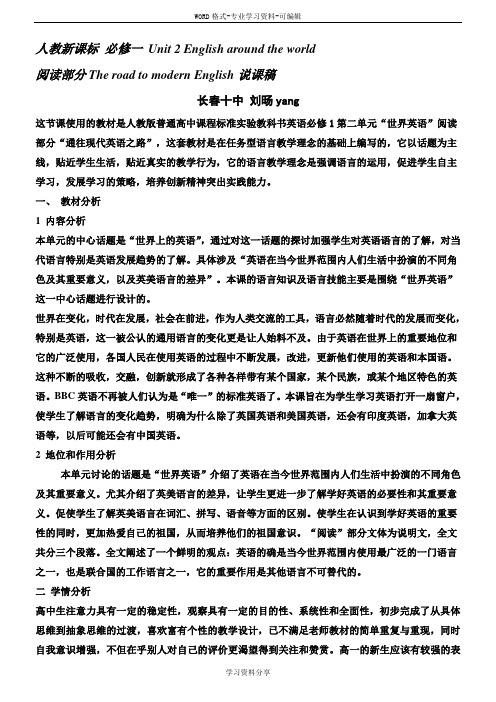
人教新课标必修一Unit 2 English around the world阅读部分The road to modern English说课稿长春十中刘旸yang这节课使用的教材是人教版普通高中课程标准实验教科书英语必修1第二单元“世界英语”阅读部分“通往现代英语之路”,这套教材是在任务型语言教学理念的基础上编写的,它以话题为主线,贴近学生生活,贴近真实的教学行为,它的语言教学理念是强调语言的运用,促进学生自主学习,发展学习的策略,培养创新精神突出实践能力。
一、教材分析1 内容分析本单元的中心话题是“世界上的英语”,通过对这一话题的探讨加强学生对英语语言的了解,对当代语言特别是英语发展趋势的了解。
具体涉及“英语在当今世界范围内人们生活中扮演的不同角色及其重要意义,以及英美语言的差异”。
本课的语言知识及语言技能主要是围绕“世界英语”这一中心话题进行设计的。
世界在变化,时代在发展,社会在前进,作为人类交流的工具,语言必然随着时代的发展而变化,特别是英语,这一被公认的通用语言的变化更是让人始料不及。
由于英语在世界上的重要地位和它的广泛使用,各国人民在使用英语的过程中不断发展,改进,更新他们使用的英语和本国语。
这种不断的吸收,交融,创新就形成了各种各样带有某个国家,某个民族,或某个地区特色的英语。
BBC英语不再被人们认为是“唯一”的标准英语了。
本课旨在为学生学习英语打开一扇窗户,使学生了解语言的变化趋势,明确为什么除了英国英语和美国英语,还会有印度英语,加拿大英语等,以后可能还会有中国英语。
2 地位和作用分析本单元讨论的话题是“世界英语”介绍了英语在当今世界范围内人们生活中扮演的不同角色及其重要意义。
尤其介绍了英美语言的差异,让学生更进一步了解学好英语的必要性和其重要意义。
促使学生了解英美语言在词汇、拼写、语音等方面的区别。
使学生在认识到学好英语的重要性的同时,更加热爱自己的祖国,从而培养他们的祖国意识。
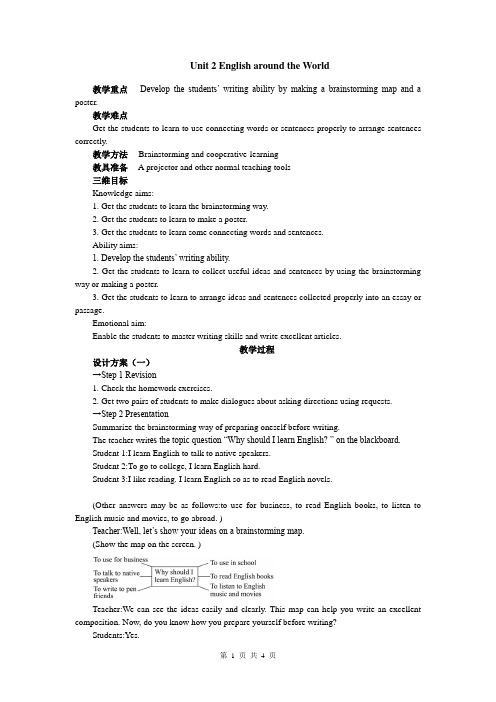
Unit 2 English around the World教学重点poster.教学难点Get the students to learn to use connecting words or sentences properly to arrange sentences correctly.教学方法operative-learning教具准备三维目标Knowledge aims:1. Get the students to learn the brainstorming way.2. Get the students to learn to make a poster.3. Get the students to learn some connecting words and sentences.Ability aims:1. Develop the students’ writing ability.2. Get the students to learn to collect useful ideas and sentences by using the brainstorming way or making a poster.3. Get the students to learn to arrange ideas and sentences collected properly into an essay or passage.Emotional aim:Enable the students to master writing skills and write excellent articles.教学过程设计方案(一)→Step 1 Revision1. Check the homework exercises.2. Get two pairs of students to make dialogues about asking directions using requests.→Step 2 PresentationSummarize the brainstorming way of preparing oneself before writing.The teacher writ es the topic question “Why should I learn English? ” on the blackboard.Student 1:I learn English to talk to native speakers.Student 2:To go to college, I learn English hard.Student 3:I like reading. I learn English so as to read English novels.(Other answers may be as follows:to use for business, to read English books, to listen to English music and movies, to go abroad. )Teacher:Well, let’s show your ideas on a brainstorming map.Teacher:We can see the ideas easily and clearly. This map can help you write an excellent composition. Now, do you know how you prepare yourself before writing?Students:Yes.→Step 3 Making a brainstorming mapThe teacher writes down the topic question “How can learning English help China in the future? ” on the blackboard. Ask students to make a brainstorming map with a partner.Several minutes later, ask a student draws the map on the blackboard.Sample map:→Step 4 Mak ing a posterFirst ask the students to make guesses about how English can help some aspects of Chinese life, in particular its economy. Then, students work on their poster in pairs. Finally, ask several pairs to present their poster in class for assessment.Sample posterWorld trade is done in English;International organizations(such as the UN)use English;We need contact with the developed Western world to build our country;The developed world uses English in its dealings.Why the Chinese language will not do?Very few people in the West speak Chinese;Chinese is a difficult language to learn;Most businessmen do not have time to learn new languages every time they entera new international market.→Step 5 Writing a short passage1. The title is “Should we learn English? ”2. Show the structure on how to write the passage.1)State your points of view.2)Show the supporting reasons.3)Get a conclusion3. Show the students connecting words which can help them to join the sentences and paragraphs.Illustration:I think. . . , I believe. . . , In my opinion. . . , As far as I am concerned. . .Addition:firstly, secondly, then, besides, at last. . .Contrast:however, but, on the other hand. . .Summary:in short, in a word, therefore, so. . .Sample passage:Should we learn English?Many people all over the world speak English as their second language. It is not too much to say that it has become an international language. So I strongly think we should learn English.Firstly, learning English can make life fun. It enables you to watch American movies, readEnglish books and listen to English songs. Moreover, as English is an international language, you will be able to communicate with foreigners when you are on a trip abroad. Traveling will be more interesting that way.Secondly, it is a good idea to make friends with foreigners. In my opinion, it is the best way to improve your English. In addition, it will be fun and it will expand your view of the world. If you make friends with a native speaker, you can practice your spoken English more often and then you can communicate with people around the world. You can also become familiar with the customs and habits of different cultures.However, there are some people who are afraid to make friends with foreigners because they are not confident of their English. However, many foreigners do not care about grammar. They will get your key words in the sentence and figure out the whole meanings. Therefore, it is unnecessary to be afraid to make friends with them; just go ahead!Learning English helps us meet different people and learn more about their culture, thus facilitating mutual understanding and harmony. Briefly said, English is so useful to us that we should all learn it.→Step 6 HomeworkWriting task on Page 53 in the workbook.设计方案(二)→Step 1 Revision1. Check the homework exercises.2. Get two pairs of students to make dialogues about asking directions using requests.→Step 2 PresentationSummarize the brainstorming way of preparing oneself before writing.→Step 3 Making a brainstorming mapWrite down the topic question “How can learning English help China in the future? ”on the blackboard. Ask students to make a brainstorming map with a partner. Several minutes later, ask a student draws the map on the blackboard.→Step 4 Making a posterFirst ask the students to make educated guesses about how English can help some aspects of Chinese life, in particular its economy. Then, students work on their poster in pairs. Finally, ask several pairs to present their poster in class for assessment.→Step 5 Writing a short passage1. The title:Should we learn English?2. The structure on how to write the passage:1)State your points of view.2)Show the supporting reasons.3)Get a conclusion.3. Connecting words:Illustration:I think. . . I believe. . . In my opinion. . .Addition:firstly secondly then besides at last. . .Contrast:however but on the other hand. . .Summary:in short in a word therefore so. . .→Step 6 HomeworkWriting task on Page 53 in the workbook.板书设计Unit 2活动与探究More and more people learn and speak English. Why? Hold a group discussion, and write a short passage titled “Why is English spoken in so many places around the world? ”to list the reasons.Sample passage:Why is English spoken in so many places around the world?English is the language most widely spoken and used in the world. Why? Industrial revolution impelled the development of England and it colonized much of the world. English began to be spoken in many other countries. America’s development also contributes to the extension of English. With the development of economy, countries communicate with each other more frequently. English is widely used and is one of the official languages of the Olympic Games and the United Nations. People realize the importance of English learning. Children go to school to learn English everywhere in the world. More people speak English as their first, second or foreign language.。
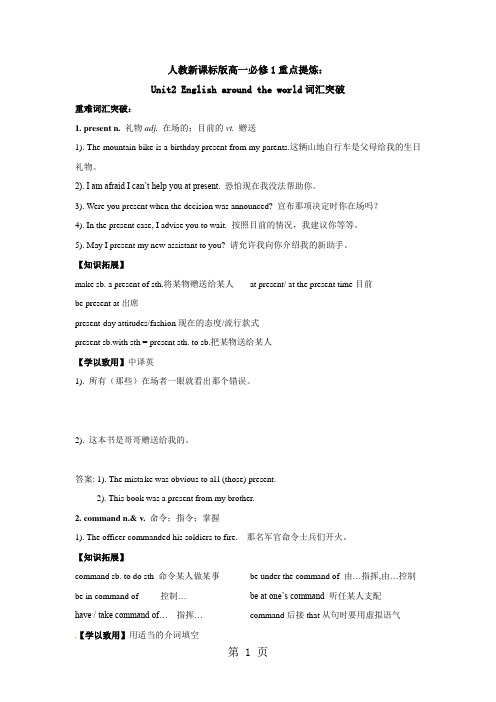
人教新课标版高一必修1重点提炼:Unit2 English around the world词汇突破重难词汇突破:1. present n. 礼物adj.在场的;目前的vt.赠送1). The mountain bike is a birthday present from my parents.这辆山地自行车是父母给我的生日礼物。
2). I am afraid I can’t help you at present. 恐怕现在我没法帮助你。
3). Were you present when the decision was announced? 宣布那项决定时你在场吗?4). In the present case, I advise you to wait. 按照目前的情况,我建议你等等。
5). May I present my new assistant to you? 请允许我向你介绍我的新助手。
【知识拓展】make sb. a present of sth.将某物赠送给某人at present/ at the present time目前be present at出席present-day attitudes/fashion现在的态度/流行款式present sb.with sth = present sth. to sb.把某物送给某人【学以致用】中译英1). 所有(那些)在场者一眼就看出那个错误。
_______________________________________________________________________________2). 这本书是哥哥赠送给我的。
_______________________________________________________________________________ 答案: 1). The mista ke was obvious to al l (those) present.2). This book was a present from my brother.2. command n.& v. 命令;指令;掌握1). The officer commanded his soldiers to fire. 那名军官命令士兵们开火。


高中英语必修1(Unit2Englisharoundtheworldthe5thperiod)精品教案TheFifthPeriod●从容说课Thisisthefifthperiodofthisunit.Inthispart,twoitemswillbedealtwith,thatis,thewordsleftinthevocabulary,thereadingintheworkbook.Thefirstitem,learningnewwordsleftinthevocabularyistoremovethebarrierinthefollowingstudy.Andhowtoletstudentslearnthewords withinterestisadifficultissue.Ithinkitisbettertogivestudentsthechancetolearnnewwordsbythemselves.Letstudentsloo kupwordsinthedictionaryand thencomm unicatewithothersinclass,whichcaninspirestudents.Andthenletthemmakeupsomesentences.Theseconditemisanotherpassageonthesubject “English”.ItgivesstudentsmuchmoreinformationonEnglish.Todealwiththispassage,7stepsaredesigned:(1)predictwhatwillbetalked(2)listentofindoutanswers(3)answerquestions(4)scanningtofillinatable(5)summary (6)discussion(7)homework●三维目标1.Knowledge:Learningtherestwordsinthevocabulary.2.Ability:Theunderstandingofthereadingpassage.3.Emotion:Guidestudentshowtoremembermorewordsassoonaspossible.●教学重点Theunderstandin gofthereadingpassage.●教学难点(1)Howtoletstudentsmasterwords.(2)Howtoletstudentsunderstandthepassagewell.●教具准备cassetterecorder;cardswithwordsonthe m●教学过程Step1GreetingsGreetthewholeclassasusual.Step2NewwordsandvocabularyT:Yesterday,Iaskedyoutolookupthewordsleftinthevocabularyinthedictionary.Haveyoubeenpreparedforit?Now,let’shaveagame.Let’sdividethewholeclassinto2groups.Eithergroupchoosesonestudentasarepresentative.I’llshowther epresentativeawordoraphrase,sheorheshouldexplainitinEnglish.Ifthegroup’smemberscanguessit,yourgroupwillwin10points.Eithergrouphas5chances.Let’sgo!Possibleexplanation:mand:(1)v.totellsb.todosth.(2)anorder2.standard:generallyusedoracceptedasnormal3.playapartin:playarolein4.dialect:awayofspeakingthatisusedonlyinaparticulararea5.request:(1)v.toasksb.todo(2)n.anactofaskingforsth.inapoliteorformalway6.polite:theoppositeofrude7.retell:totellastoryagainorinadifferentform8.accent:awayofsayingwordsthatshowswhatcountry,esfrom9.recognize:toknowwhothepersonis10.eastern:inorfromtheeast ofacountryorplaceT:Welldone!Nowlet’sdealwiththesomeofthewordsandphrasesindeal.mandv.命令,指挥commandsb.todo;commandsth.;博得,应得commandthat-clausee.g.Hecommandedhismantoretreat.ThetroopswerecommandedbyGerneralHaig.Thekingcommandedthatshe(should)beexecuted.(建议,命令,要求一类词后从句中用虚拟语气,此类动词有suggest,advise,order,request,require,command,demand...)Hecommanded thebuilding(should)betorndown.n.命令[C];指挥,控制[U]e.g.Areyourefusingtoobeymycommands?Youmustobeyhiscommandthatthebuilding(should)betorndown.Takecommandof;beincommand;underone’scommand;underthecommandofsb.e.g.Shetookcommandofthisclassaftertheformermanagerleft.Shefeltincommandofherlife.ThebattleshipisunderthecommandofCaptainBlake.2.requestv.requeststh.(fromsb.);requestsb.todo;requestthat-clausee.g.Youcanrequestafreecopyoftheleaflet(宣传单).Youarerequestednottosmokeintherestaurant.Sherequestedthatnoone(should)betoldofherdecision untilthenextmeeting.n.request(forsth.);request(that)e.g.Requestsforvisaswillbedealtwithwithin48hours.Herrequestthatmoresweetsbeservedwasrefused.3.recognize辨认出;意识到;承认recognizesb./sth.(by/fromsth.)通过……认出……;recognizesth.(assth.);把……认作是……recognizethat意识到;承认e.g.Irecognizedthehousefromyourdescription.Drugswerenotrecognizedasaproblemthen.Nobodyrecognizedhowurgentthesituationwas.Werecognizedthatthetaskwasnoteasy.4.standardn.规格,标准[C&U]raise/improve/lowerstandard提高/降低标准set(sb.)astandard给某人定一个标准e.g.Hesethimselfsuchahighstandardthatheoftendisappointshimself.ofhigh/lowstandard具高/低标准的standards行为标准,道德标准amanofhighstandards一个道德高尚的人Step3ReadingT:WehavelearntEnglishformanyyears.Theninyouropinion,whatisaveryimportanthelptoyourEnglishstudy?S:teachers,books,tapes...T:Anythingelse?IsthereanythingthatyoucanturntoforhelpwhenyouareconfusedwhilelearningEnglish?S:Ithinkadictionaryisagreathelp.T:Yeah.Whenwemeetacrossnewwordsweoftenlookthemupinadictionary.Whatisthemostwidely-useddictionaryinChin ese?S:XinhuaDictionary.T:ThenwhichonedoyouthinkisusedwidelyinEnglish?S:I’msorryIhavenoidea.T:It’s LongmanDictionary andthe OxfordEnglishDictionary.Today,we’llreadapassageonthe OxfordEnglishDictionary.Nowaccordingtothetitle,whatdoyouthinkwillbementionedinthepassage?S:Ithinkthewriter,thetimewhenwasitwritten,whyitwaswritten,howitwaswritten,thefeatureofthedictionarywillbementioned.T:Now,let’slistentoittoseewhetheryouranswerisrigh t.(afterlistening)T:Doyouthinkthatyouranswerisright?S:Ithinkthatitdoesn’tmentionthefeatureofthedictionary.T:Yes.Nowlet’sreaditaloudtoanswerthesequestionsthen.①Whywasitwritten?②Whendiditstarttobewritten?③Whoisthewriter?④Howitwaswritten?S:①Toencourageeverybodytospellthesame.②Theideawasraisedin1857.And22yearsl ater,itbegantobewritten.③Threemenworkedtogetheronthedictionary:SamuelJohnson,NoahWebster,andJamesMurray.④Ittookthethreemennearlyalloftheirlivestotrytocollectwords.T:Goodjob!Thenwhofirstbegantoworkonthedictionary?S:Murray.T:Yes.Nowlet’sreadthelastparagraph.AndthenfinishthetableaboutnotesonJamesMurray’slifewithyourpartners.(checktogether)Step4Consolidation/discussionT:Afterreadingit,canyousaysomethingaboutMurray?Let’sdoachainreaction.EachstudentjustsaysonesentenceaboutMurray.T:Doyouthinkitworthsothesepeople’sspendingsomuchtimeon?Why?Nowdiscusswithyourpartnerandlistsomereasons.(discussforabout3minutes)Now,it’sshowtime.S:Wethinkthatitworththeirjob.Iftherewerenodictionaries,peoplewouldhavenoruletoguidethemwhileusingthelanguage,whichwillleadtoamessinEnglishbecausedifferentpeople wouldusedifferentlawstouseit.Thentherewillbemoredifficul tyinunderstandingoneanother.Withthedictionary,peoplehaveasetruletojudgewhethertheirwayofusingthelanguageisright.Step5SummaryandhomeworkToday,wehavelearnedthewordsleftinthevocabularyandwe’vegotsomeinformationonthelargeEnglishdictionary.Afterclass,pleasereadthewordsagainandagaintorecitethemandtrytousethemtomakeupsentences.●板书设计Unit2EnglisharoundtheworldTheFifthPeriodWordsmand2.request3.recognize4.standardUnderstandingofthepassageGuessingQuestions●活动与探究ThisresearchistodoresearchontheconceptoftheOxfordDictionaryandsomeotherkindsofdictionaryinEnglishspok encountries.SostudentsshouldworkingroupstostudytheitemsoftheOxfordDictionaryandfindoutthenamesofothertypenames Themostpopularone ThereasonAbout theOxfordEnglishDictionaryThe OxfordEnglishDictionary istheacceptedauthorityontheevolutionoftheEnglishlanguageoverthelastmillenniu m.Itisanunsurpassedguidetothemeaning,history,andpronunciationofoverhalfamillionwords,bothpresentandpast.Ittracestheusageofwordsthrough2.5millionquotationsfromawiderangeofinternationalEnglishlan guagesources,fromclassicliteratureandspecialistperiodicalstofilmscriptsandcookerybooks.The OED coverswordsfromacrosstheEnglish-speakingworld,fromNorthAmericatoSouthAfrica,fromAustraliaandNewZealandtotheCaribbean.Italsooffersthebestinetymologicalanalysisandinlistingofvariantspelli ngs,anditshowspronunciationusingtheInternationalPhoneticAlphabet.Asthe OED isahistoricaldictionary,itsentrystructureisverydifferentfromthatofadictionaryofcurrentEnglish,inwhichonlypresent-daysensesarecovered,andinwhichthemostcommonmeaningsorsensesaredescribedfirst.Foreachwordinthe OED,thevariousgroupingsofsensesaredealtwithinch ronologicalorderaccordingtothequotationevidence,i.e.thesenseswiththeearliestquotationsappearfirst,andthesenseswhichhavedev elopedmorerecentlyappearfurtherdowntheentry.Inacomplexentrywithmanystrands,thedevelopmentovertimecanbeseeninastructurewithseveral“branches”.TheSecondEditionofthe OED iscurrentlyavailableasa20-volumeprint edition,onCD-ROM,andnowalsoonline.Updatedquarterlywithatleast1000newandrevisedentries,OED Onlineoffersunparalleledaccesstothegreatestcontinuingworkofscholarshipthatthiscenturyhasproduced’(Newsweek).Tofindoutmoreaboutthe OED Online,whynotfollowourfree tour?“Aboutthe OxfordEnglishDictionary”invitesyoutoexploretheintriguingbackgroundanddistinctivecharacterofthe OED.Here,youwillfindin-deptharticlesaboutthehistoryofthe OED,aninsidelookattheprogrammesusedtoenlargeandupdatethe OED entries,little-knownfactsaboutitscontent,andmuchmore.。

Unit 2 English around the worldThe First Period●从容说课This is the first period of this unit.This period focuses on reading.In this lesson,there are a warming up and a passage of reading “The Road To Modern English”.This warming up attracts students’ attention to the phenomenon of world English.The reading passage tells us the present situation in which English is used and the deve lopment of English.To let students to form a good habit of reading and have proper reading strategies are one of the main tasks for senior middle school English teaching,so in this period,we should teach according to this aim.In this lesson,students will have a general idea of the conception of world English by guessing some words on American English and Britain English.To arouse students’ interest,I’ll present them some typical funny stories about different kinds of English.This is to get the students ready for the reading part.Before reading the passage,students should first get familiar with the new words in the text to remove the barrier in reading.Then students are asked to guess what the text will tell us.This step is designed to train students ability to predict the content of a passage according the title.The next step is to ask students to have a general idea of the structure of the text with the purpose of improving the skill of skimming.After that,detailed reading follows.In the step,students will be asked to deal with the passage paragraph by paragraph in which they will have different tasks to finish such as true-or-false exercise,filling a form with information in the text and retelling.This step trains students’scanning skill and conclusion skill.The last step for students is to discuss the topic “It is not necessary for we Chinese to learn English since we have our own elegant language”.This is to train students to read critically.Besides,it can arouse students’ interest in learning English.●三维目标1.Knowledge:Master the words and phrases and get a view of the road to modern English.2.Ability:Train students’ reading skill.3.Emotion:Let students know more about English and inspire students to study English hard.●教学重点The understanding and comprehension of the passage.●教学难点(1)How to get to master the useful words and expressions.(2)How to improve students’ ability to read an article.●教具准备cassette recorder,some pieces of slide●教学过程Step 1 GreetingsT:Good morning,boys and girls!S:Good morning,teacher!Step 2 Warming upT:English is a widely used language.Do you know in which countries English is spoken as their native language?S a:The US,the UK,Australia,Canada...T:(a slide:Nancy:Oh,there you are.Now then,did you have a good flight?Joe:Sure,we flew all the way direct from Seattle to London.Nancy:You must be very tired.Did you sleep at all on the plane?Joe:No,not really.I’m very tired.Could I use your bathroom?Nancy:Why,of course.You don’t need to ask,just make yourself at home.Let me give you a clean towel.Joe:A towel?Nancy:Yes.Here you are.The bathroom is upstairs.It’s the second door on the left.(After a while)Nancy:Have you found it?Joe:Well,eh,yes,I mean no.I mean,I found the bathroom,but I didn’t find what I was looking for!)Here is a short dialogue.Read it and discuss with your partner:What is it that Joe can’t find in the bathroom?Why can’t he find it?S b:It is the toilet.T:And why?S c:Perhaps when Joe says “bathroom”,he means a place,where there is a toilet.But in Nancy’s eyes,it is a place where people can only have a bath.T:You are right.Do you know why there’s a misunderstanding between them?S d:Because they sp eak different kinds of English.T:Great.There’s more than one kind of English in the world.In some important ways they’re different.They’re called world English.Can you guess what they include?S e:Canadian,British,American,Australian and Indian English.T:Right.So you know even two native speakers of English may still not speak the same kind of English.Look at the examples on P9.Now try to guess which of the following words are British English and which are American English.Suggested answers:Am.English:mom;on a team;rubber;gasBr.English:mum;in a team;eraser;petrolStep 3 New WordsT:From today on,we’ll learn something about English around the world.First of all,let’s get familiar with the new words.Yesterday I asked you to read the new words and look up the meaning of them.Now let’s have a game in which one of you tells us the meaning or the explanation of the words and the others guess which word it is.Let’s go!Suggested explanation:1.include:have something or somebody as one of a group.e.g.:The tour included a visit to the Science Museum.2.play a role in:have a part in3.international:connected with two or more countries4.native:(1)connected with the place where you have always lived or have lived for a long time(2)a person who lives in a particular place,especially sb. who has lived there a long time5.elevator:lift6.flat:(1)having a smooth surface (2)(Br. E)a set of rooms for living in7.apartment:(Am. E)a set of rooms for living in8.modern:of the present time or recent timee up:to move toward10.culture:the customs and beliefs,art,way of life and social organization of a particular country or group11.actually:really;in fact12.present:(1)existing or happening now (2)being in a particular place13.rule:control14.vocabulary:all the phrases and phrases you learnage:the way in which words are used in a language16.identity:who or what sb./sth. isernment:the group of people who are responsible for controlling a country or a state18.rapidly:fastT:That’s great!You’ve made a good preparation.Now please read the words together.(show words and explanations on the slide)Step 4 Pre-readingT:Just now,we’ve known that there’re many kinds of English in the world.Then why are there so many kinds?Ss:We don’t know.T:Anyway,we’ll find out the cause today.Now read the title of the passage “the road to modern English”.What do you think it will tell us?S f:I guess it will tell us the development of English.Step 5 SkimmingT:Now let’s find out whether your answer is right.So please read the passage fast in silence and find out the main idea of each paragraph.Suggested answer:Para.1:Brief introduction of the change in English.Para.2:An example of different kinds of English.Para.3:The development of English.Para.4:English spoken in some other countries.Step 6 ScanningT:You’ve mastered the structure of the passage.Now please read para.1 and 2 loud in detail.T:(several minutes later)Have you finished?Here’re some statements of which some are right while some not.Read them and then tell whether they are true or false.If false,please find out the mistake and correct it.(slides:1.Most of the English speakers in the 16th century lived in England.2.More and more people use English as their first or 2nd language.3.The US has the largest number of English speakers.4.Native English speakers can understand everything because they speak the same kind ofEnglish.)S g:The first one is true.S h:The second one is true.S i:The third one is false.China has the largest number of English speakers.S j:The fourth one is false.Native English speakers may not be able to understand everything because they do not speak the same kind of English.T:You did a very good job.Now please read para.3 after the tape.And then fill in the formThe Road To Modern EnglishThe cause:Cultures communicate with one anotherTime Things that happenedBetween AD 450and 1150Based on German1150 to 1500 Less like German;more like French→why?→because Frenchmen ruled England thenIn the 1600’s Shakespeare broadened the vocabulary.A big change in English,giving its own identity→why?→caused by “American Dictionary of the English language”written by Noah WebsterLater British people brought English to AustraliaT:We know culture communication brings about changes in English.Can you think of any effect that Chinese has on English?S k:In English there are some Chinese words such as gongfu,long time no see,...T:Great!With more closely communication of culture,English is changing more frequently.T:As we all know,English is spoken as the native language mostly in western countries.Then what about English in some other parts of the world?After reading the last paragraph,would you please say something about the present situation of English in your own words?S l:It is also spoken as a foreign or 2nd language in many other countries.For example,in India,it is used for government and education.In some African and Asian countries,it is also spoken,such as in South Africa,Singapore and Malaysia.While in China,the number of English speakers is increasing fast.T:Quite good.Step 7 DiscussionT:So far,we’ve known that English is becoming more and more important in China.It has been an important subject for Chinese students.But someone say that Chinese is a much more elegant language.So it is more important for us to master it and it is not so necessary for us to master a foreign language.Do you agree with this opinion and why?Suggested answer:I don’t agree with it.With the cultural communication becoming more and more frequent,the chance to contact foreigners,exported goods,international conferences,and so on,is more and more.As the most widely used language,English is regarded as the language used in most international situations.Thus,if we want to keep up with the times,we’d better master English and use it as a tool.Step 8 Summary and homeworkT:Today we’ve learned an article on “the road to modern English”.After class,you shouldread it again and again to get the idea of the text further.Do the exercises of comprehending and try to tell your partner something about English in our own words.That’s all for today.Class is over.●板书设计Unit 2 English around the worldThe First PeriodNew words:Main idea of each para-graph:... ...... ...●活动与探究This activity is to make research into differences between different kinds of world English and some words from other languages in English.Differences Pronunciation Spelling MeaningUsage...Words from other languages Chinese Japanese French Spanish German...●备课资料Soon There Will Be No Such Thing As “Wrong”English In this article:Senior Indian journalist Gautaman Bhaskaran says that English is so flexible that one day there will be too many variations around the world.English is a victim of its own success.The other day The Times in London displayed a cartoon showing an excited schoolboy flaunting his test scores:“I done good in English.”Days later,editors of the Oxford Dictionary of English rued the spread of what they termed “greengrocer’s English”.Grammar and syntax,they regretted,were going out of fashion.Others in England—in the Oxf ord University Press,the BBC and so on—said the incorrect use of cliches were marring the smooth flow of a great language whose ability to imbibe and absorb has been one important reason for its success.This success also stems from the language’s unique position of being the only one spoken in most parts of the world.Really,English has no boundaries.Even in countries such as Japan and China,which were not colonized by Britain,English is making a determined “conquest”.Unfortunately,such a conquest is not always welcome because a language sometimes doubles as a political weapon.At some point it ceases to be just a means of communication and English is a classic example of this.It has always led a troubled life.It has been disliked,even hated,largely because the people who originally spoke English conquered,colonized and terrorized half the world,or just about.The animosity to the language continues,at least in some places.The bitterness that the French,for instance,have for English is a g ood example of a language being giving a quasi-political role in society.Fortunately,this aversion does not run as it did some years ago,and there is a growing realization that English is the lingua franca.China and Japan,among a host of other nations,have been making serious efforts to promote the language.Some months ago there was a hue and cry in Singapore over the spread of “terrible English”which the authorities called “Singlish”.“Down with it!”they said,and urged Singaporeans to learn correct English,the phenomenal flexibility of which has often made things difficult for those who have to use it every day.Today even university graduates find it hard to pen a couple of correct sentences in it.More horrifying is that many teachers and university vice-chancellors speak and write poor and ungrammatical English.Often,they are found to be out of touch with what is called “usage”and,as we all know,this is one of the pillars the language rests on.Yet,despite the mess that English is in India,the nation has—more than two centuries after Samuel Johnson wrote his English dictionary—become the hottest destination for top lexicographers.The new 10th revised edition of the Oxford Concise English Dictionary includes hundreds of Indian words.Leading the list of 600 Indian English entries are “Hindutva”(Hindu identity),“dada”(older brother),“panchayat”(local administration),“chai”(tea),“pani”(water),“puri”(a dish made of wheat)and “dosa”(rice pancake).In fact,Indian words from 20 per cent of entries and rank as the third-largest component after American and Australian English segments.Other former British colonies such as New Zealand,South Africa and the Caribbean islands follow the Indian English collection of words.English,despite its hiccups,is endearing to the common Indian man or woman.About 150 years after Lord Macaulay introduced the language in India to create “babus”(clerks)for the British bureaucracy,70 million Indians speak English,a number that is higher than that in Britain.However,there is a sneaking fear among Puritans that with this kind of sp read,English may stop being English.While the French have fanatically preserved the purity of their language,the English have liberally allowed other influences to affect their lingo.So,what is seen as its strength —the fact that people all over the world understand it—can be an undermining obstacle.There might be a serious problem if every state or continent were to have its own version of English.As one writer said:“There is a risk in relentless atomization.”With too many variations of the language,a time may come when one group of English-speaking people may not be able to understand another.This is happening.Hear the way Singaporeans speak English.Listen to the Australians pronouncing “e”;it sounds like “a”.A few of the films made lately by British directors Ken Loach and Mike Leigh had to have subtitles in English.Accents in the north of Britain can be hard for people in the south to understand,let alone those outside the island.The point is,no language must be allowed such flexibility—anything goes in the name of functional communication—that people begin to take liberties with it.Ultimately,there may be no such thing as wrong English.The schoolboy in the Times cartoon was doing just that.He knew nobody would scold him for getting his English wrong.不久以后就没有“错误的”英语这一说了英语成了自身成功的牺牲品,前几天,伦敦的《泰晤士报》刊登了一幅漫画,上面画了一个兴高采烈的男学生炫耀他的考试成绩:“I done good in English”(我的英语成绩不错)。

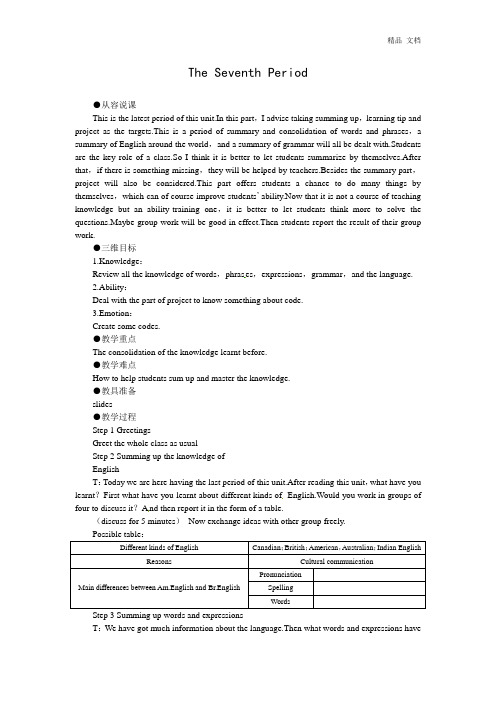
The Seventh Period●从容说课This is the latest period of this unit.In this part,I advise taking summing up,learning tip and project as the targets.This is a period of summary and consolidation of words and phrases,a summary of English around the world,and a summary of grammar will all be dealt with.Students are the key role of a class.So I think it is better to let students summarize by themselves.After that,if there is something missing,they will be helped by teachers.Besides the summary part,project will also be considered.This part offers students a chance to do many things by themselves,which can of course improve students’ ability.Now that it is not a course of teaching knowledge but an ability-training one,it is better to let students think more to solve the questions.Maybe group work will be good in effect.Then students report the result of their group work.●三维目标1.Knowledge:Review all the knowledge of words,phras es,expressions,grammar,and the language.2.Ability:Deal with the part of project to know something about code.3.Emotion:Create some codes.●教学重点The consolidation of the knowledge learnt before.●教学难点How to help students sum up and master the knowledge.●教具准备slides●教学过程Step 1 GreetingsGreet the whole class as usualStep 2 Summing up the knowledge ofEnglishT:Today we are here having the last period of this unit.After reading this unit,what have you learnt?First what have you learnt about different kinds of English.Would you work in groups of four to discuss it?A nd then report it in the form of a table.(discuss for 5 minutes)Now exchange ideas with other group freely.Different kinds of English Canadian;British;American,Australian;Indian English Reasons Cultural communicationMain differences between Am.English and Br.English Pronunciation SpellingWordsStep 3 Summing up words and expressionsT:We have got much information about the language.Then what words and expressions havewe learnt?Discuss with your partner and make a list.S:Noun:role,native,culture,vocabulary,usage,identity,government,phrase,command,request,standard,accentVerb:include,rule,command,request,retell,recognizeOther expressions:play a role (in);because of;come up;be present at;such as;be polite to Then please use the right forms of the words or phrases to fill in the blanks:1.The famous actor said he looked forward to ____________ in the movies directed by talented Zhang Yimou.2.The sports meet was put off ____________ the bad weather.3.After reading the text,we were told to ____________ the passage using our own words.4.He changed so much that I didn’t ____________ him at first.5.More than half of the people who were invited ____________ the meeting.6.In this vacation,I plan to do many things ____________ traveling to Hong Kong.7.Nobody dared to go against his ____________ that everyone (should)leave until 8 o’clock.8.The problem ____________ at the meeting has been solved.Suggested answers:1.playing a role2.because of3.retell4.recognize5.were present at6.includingmand ing upT:A good summary.Then would you please fill in the blanks with correct forms of words.Step 4 Summing up grammarIn this unit,we met across a new grammar item:request and command.Now recall the sentence patterns with your partner.Command:Do/Do not do...Request:Do/Do not do...please.Can you do...?Could you do...?Will you do...?Would you do...?Step 5 Learning tipsT:We know interest in the mother of success.If you find that the thing that you are doing is not so interesting,it’s not so likely that you will succeed.It is the same case with the study of English.So when you learn English,you’d better try to find fun in the study.For example,try to make jokes using words which have different meanings.For example:①Don’t rock that baby on the rock while playing that rock music.②I wish to wish the wish you wish to wish,but if you wish the wish the witch wishes,I won’t wish the wish you wish to wish.③If white chalk chalks white on a black blackboard,will black chalk chalks black on a white whiteboard then?Will you find out more funny things in studying English?Some slang in America:Beats Me 林先生刚到美国时,经常不经意间听到“Beats me”这句话,心想总不会叫人揍自己吧!例如,有人问:“When is this rain supposed to stop?”对方可能回答“Beats me !”若再问:“Where are your parents?”,对方回答也可能是“Beats me!”这句话如此管用,几乎适用于任何场合,那么到底是什么意思呢?林先生求教于人,得知其意是“I don’t know”——我不知道,我无法回答。
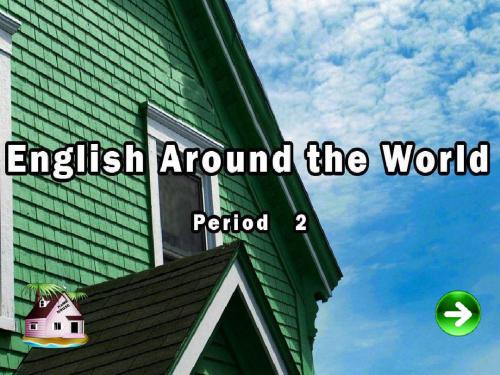
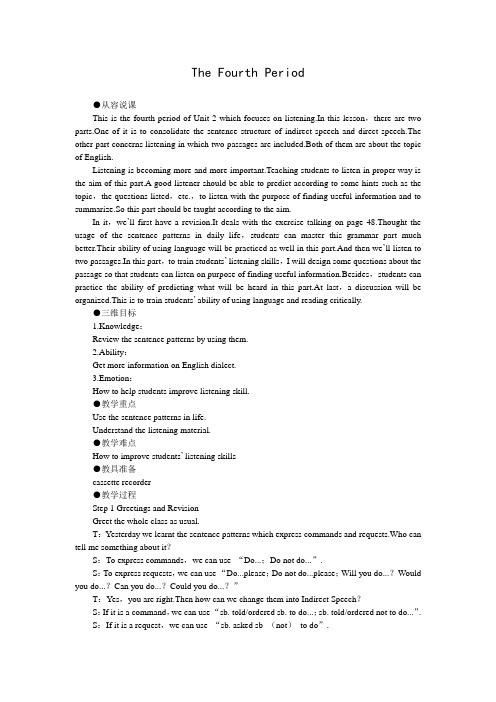
The Fourth Period●从容说课This is the fourth period of Unit 2 which focuses on listening.In this lesson,there are two parts.One of it is to consolidate the sentence structure of indirect speech and direct speech.The other part concerns listening in which two passages are included.Both of them are about the topic of English.Listening is becoming more and more important.Teaching students to listen in proper way is the aim of this part.A good listener should be able to predict according to some hints such as the topic,the questions listed,etc.,to listen with the purpose of finding useful information and to summarize.So this part should be taught according to the aim.In it,we’ll first have a revision.It deals with the exercise talking on page 48.Thought the usage of the sentence patterns in daily life,students can master this grammar part much better.Their ability of using language will be practiced as well in this part.And then we’ll listen to two passages.In this part,to train students’ listening skills,I will design some questions about the passage so that students can listen on purpose of finding useful information.Besides,students can practice the ability of predicting what will be heard in this part.At last,a discussion will be organized.This is to train students’ ability of using language and reading critically.●三维目标1.Knowledge:Review the sentence patterns by using them.2.Ability:Get more information on English dialect.3.Emotion:How to help students improve listening skill.●教学重点Use the sentence patterns in life.Understand the listening material.●教学难点How to improve students’ listening skills●教具准备cassette recorder●教学过程Step 1 Greetings and RevisionGreet the whole class as usual.T:Yesterday we learnt the sentence patterns which express commands and requests.Who can tell me something about it?S:To express commands,we can use “Do...;Do not do...”.S:To express requests,we can use “Do...please;Do not do...please;Will you do...?Would you do...?Can you do...?Could you do...?”T:Yes,you are right.Then how can we change them into Indirect Speech?S:If it is a command,we can use “sb. told/ordered sb. to do...;sb. told/ordered not to do...”.S:If it is a request,we can use “sb. asked sb (not)to do”.T:Please tell which one is the right answer.“____________,”Li Ming said to his teacher.A.Can you buy me a new watch?B.Give me that book,C.Lend me your bike,D.Could you help me with my English?S:I think D is the right answer.T:Could you tell me why?S:Because A is not logical.B and C are commands.In last period we learnt that commands should be made by people who have authority.So I think here D is right.T:Your explanation is perfect.Step 2 Talking (Workbook P48)T:Great.Now let’s practise the sentence patterns by making up dialogues.So please turn to P48 and look at the part of talking.Please work in groups of four.And choose one situation to role-play.(5 minutes for preparation)T:Now let’s begin.Possible version:Group 1:A.(foreigner):Excuse me,could you give me a hand?B:Sure.You seem to be looking for someone.A:Yes.My Chinese friends and I promised to meet at the exit of the subway.B:Could you speak a bit slowly.I can’t quite follow you.I guess you are looking for your Chinese friends.A:I’m sorry.I wasn’t noticing it just now.Yeah,we said that we would meet here—the exit of the subway at 2 p.m.And it is 2:15,but I still can not find them.B:Exit 1 or Exit 2?A:What do you mean?There’re 2 exits?B:Yes.Here are two exits.So you should be sure which one is where you promised to meet.A:I see.I am sure that they must be waiting for me at the other exit.Thank you very much!Group 2:(P:parents;W:waitress;Y:you)P:Excuse me,could you tell me where the toilet is?W:Er...the restroom?Well,go straight ahead,and it will be at the end of the corridor.P:But we do not need rest.We are just looking for a toilet.Y:I mean we want to go the WC.W:WC?We don’t have one.Y:No WC!How can a restaurant have no WC?W:I’m sorry!But what do you really mean by saying WC?Y:It’s a place where we can wash hands.W:Ah,I see.Well,go up to the second floor.Y:Thank you so much!(You and your parents go up two floors but only find empty rooms there.)W:Have you found it?Y:No,we went up two floors,but we didn’t find a toilet but empty rooms.Group 3:A:Excuse me,could you help me?B:Sure?What’s it?A:Our English teacher is telling us something important,but I can quite follow her.She’s speaking so fast.B:Yeah,she’s really speaking fast.Then how can I help you?A:Could you ask the teacher to speak a little bit slowly?B:Of course I can,but why don’t you do so?A:Er...B:I see.(Student B puts up his hand)T:Yes?B:I’m sorry,but would you speak a little slowly?Step 3 Listening (Ⅰ)T:Yesterday,we have learnt something about dialects in the US.Today let us listen to the dialogue spoken with an accent.Please turn to the listening part on P14.First listen and find out how many people there are in the dialogue and who they are.S:...T:Great!Now please listen to it again,and answer the questions on the text book.(after listening)Have you got the answers?Now compare notes with your partner.T:Are you sure about your answers now?Let’s check together.T:You did a very good job.Now we will listen to it again.After that,you should retell the story to your partner.See?S:...T:So you see,there is some difficulty for people to understand the dialects.Right?So what we do while learning English?S:We can learn standard English.S:I don’t think so,because we have learnt that there’s no standard English actually.So I think what we should do is to pronounce better,and use the correct words and grammar.Step 4 Listening (Ⅱ)T:By reading the passage “the road to modern English“,we have known English is a world language which is spoken in many countries and areas.In this period we will listen to native speakers from different English-speaking countries.Please move to P51 and look at Listening Task.Now several students in an international high school in Shanghai are describing where they come from.What do you think you will hear in their introduction?S:I guess they will talk about the location,climate,people,custom,specific things,and so on.T:You are very clever.We are introducing some place,most of time we will give some description of the climate,people,custom,people,history,places of interests,and so on.T:Listen carefully,then tell which topics are mentioned.S:...T:Good.Then I will play the tape again.This time you should try to guess the name of each student’s country.S:...T:Good job.This time,you should pay much attention to each student’s description.After listening it again,you should describe the country using your own words.S:...T:Well done!Now work in groups of four and discuss with your partners why English is spoken in so many places around the world.Make a list of the reasons and then report your group work with other groups.Step 5 SummaryThis class we have review the grammar part by using it in daily life.We have practised reading as well.We learn the language in order to use it.So I advise you practise using what we learnt daily so that they can be part of your knowledge.Step 6 HomeworkLook up the words left in the vocabulary in the dictionary.●板书设计Unit 2 English around the worldThe Fourth PeriodSentence patternsGuessing the topics mentioned in the tape●活动与探究This activity is to do some research on the listening skills.Students are required to surf the internet to search for some information on advice on improving listening.●备课资料ColorsAmericans have used colors to create many expressions they use every day.We say we are “in the pink”when we are in good health.It is easy to understand how this expression was born.When my face has a nice fresh,pink color,it is a sign my health is good.If I look gray and ashen,I may need a doctor.Red is a hotter color than pink.And Americans use it to express heat.In English,the small and hot peppers(辣椒)found in many Mexican foods are called “red hots”,for their color and their fiery(火辣辣的).We say that fast,fiery music,especially the kind called “Dixieland Jazz”is “red hot”.Blue is a cooler color.The traditional blue music of American blacks is the opposite of the red hot music.It is slow,sad and soulful.Duke Ellington and his orchestra (管弦乐队)recorded a famous song,Mood Indigo(《深蓝的情调》),about the deep blue color,indigo.In the words of the song,“You aren’t been blue till you’ve had that Mood Indigo”.To be “blue”,of course,is to be sad.While the color green is natural for trees,it is an unnatural color for humans.When someone does not feel well,someone who is sick for example,we say he looks green.When someone is angry because he does not have what someone else has,we say he is “green with envy(忌妒)”.Some people are “green with envy”because someone else has more dollars,or “greenbacks”.Dollars are called greenbacks because that’s the color of the back side of the money.The color black is often used in expressions.People describe a day in which everything goes wrong as a “black day”.A “black sheep”is the member of a family or group who always seemsto be in trouble.A “blacklist”is illegal(非法的)now,but at one time,some employers shared blacklists of people who should not be given work.Not all the “black”expressions have bad meanings.A business “in the black”,for example,is one with profits(利润).A company “in the red”is losing money.Red ink is used to show losses in a financial report.Profits are written in black.If someone tells you to put something “in black and white”,they want you to write it down.In some cases,colors just describe a situation.A “black out”,in World War Two,was when all lights were turned off to make it difficult for bomber planes to find their target(目标)at night.A “brown out”is an American expression for reduced electrical power which makes electric lights dim.American women use the French word for red as the name of the colored cosmetic(化妆品)which they sometimes use to brighten their cheeks.It’s just called “rouge”.They use it especially when they are going out for the evening,or as Americans say “to paint the town red”.The color yellow is sometimes used to describe a coward(胆小鬼).A person who is “yellow”has no courage.A person’s skin may become yellow as a result of diseases that attack the liver(肝).Yellow fever is one.In the past,ships carrying fever victims raised a flag called the “yellow jack”.In the United States,an activist organization of old people calls itself the “gray panthers”(灰豹).The name comes from the gray hair of its members and from the panther,a fierce animal of the lion or leopard(豹)family.Words and IdiomsTo eat crow乌鸦肉根本没法吃,因此要一个人吃乌鸦,那肯定是非常难受的。
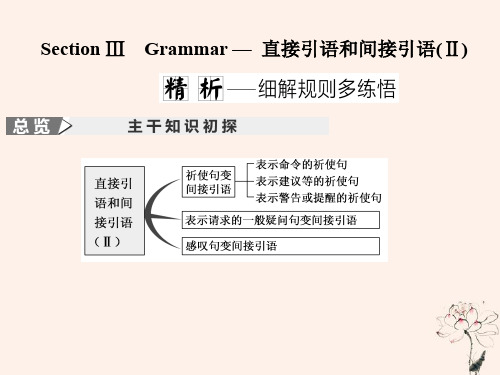

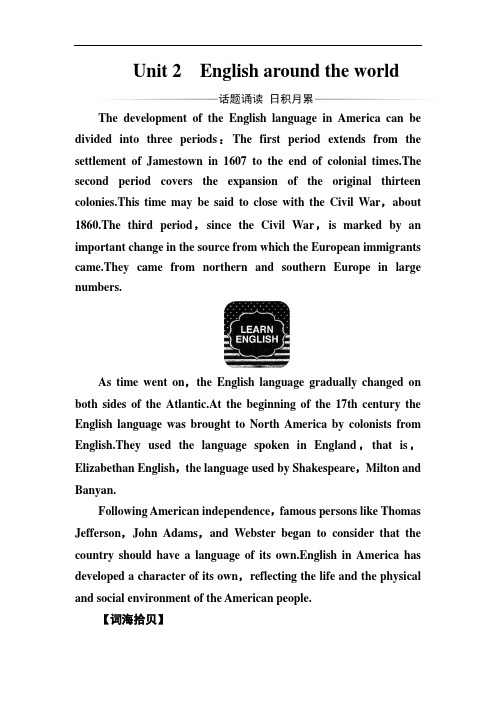
Unit 2English around the worldThe development of the English language in America can be divided into three periods:The first period extends from the settlement of Jamestown in 1607 to the end of colonial times.The second period covers the expansion of the original thirteen colonies.This time may be said to close with the Civil War,about 1860.The third period,since the Civil War,is marked by an important change in the source from which the European immigrants came.They came from northern and southern Europe in large numbers.As time went on,the English language gradually changed on both sides of the Atlantic.At the beginning of the 17th century the English language was brought to North America by colonists from English.They used the language spoken in England,that is,Elizabethan English,the language used by Shakespeare,Milton and Banyan.Following American independence,famous persons like Thomas Jefferson,John Adams,and Webster began to consider that the country should have a language of its own.English in America has developed a character of its own,reflecting the life and the physical and social environment of the American people.【词海拾贝】1.colonial adj.殖民的2.expansion n.扩张3.immigrant n.移民【问题思考】True (T)or False (F):1.The development of the English language in America can be divided into four periods.()2.At the beginning of the 17th century the English language was brought to South America.()答案:1.F 2.FⅠ.重点单词分类记★拼写高频单词1.________adj.官方的;正式的;公务的2.________adj.本国的;本地的n.本地人;本国人3.________n.词汇;词汇量;词表4.________n.&v t.命令;指令;掌握5.________n.&v t.请求;要求6.________ad v.直接;挺直adj.直的;笔直的;正直的7.________n.街区;块;木块;石块答案:1.official 2.native 3.vocabulary mand 5.request 6.straight7.block★联想拓展单词1.________v t.以……为根据n.基部;基地;基础→________adj.基本的;基础的2.________adj.逐渐的;逐步的→________ad v.逐渐地;逐步地3.________adj.较后的;后半的;(两者中)后者的→______adj.最近的;最新的→________adj.后期的________ad v.近来;最近4.________n.本身;本体;身份→________v t.&v i.认出;鉴定5.________adj.流利的;流畅的→________ad v.流利地;流畅地→________n.流利;流畅6.________adj.频繁的;常见的→________ad v.常常;频繁地7.________v t.表达;表示→________n.词语;表示;表达8.________v t.辨认出;承认;公认→________n.认出;承认9.________adj.现实的;实际的→________ad v.实际上;事实上10.________n.使用;用法;词语惯用法→________v t.使用→________adj.有用的→________adj.无用的答案:1.base basic 2.gradual gradually tter latest later lately 4.identity identify 5.fluent fluently fluency 6.frequent frequently7.express expression 8.recognize recognition9.actual actually 10.usage use useful useless ★识记阅读单词1.elevator n.________________2.voyage n. ________________3.apartment n. ________________4.enrich v t. ________________5.spelling n. ________________6.identity n. ________________7.accent n. ________________8.lightning n. ________________9.cab n. ________________答案:1.电梯;升降机 2.航行,航海 3.〈美〉公寓住宅;单元住宅 4.使富裕;充实;改善 5.拼写;拼法6.本身;本体;身份7.口音;腔调;重音8.闪电9.出租车Ⅱ.重点短语快速记1.________________超过;非常;不仅是2.________________走近;上来;提出3.________________以……为基础4.________________信不信由你5.________________扮演一个角色;参与6.________________因为;由于7.________________……的数量8.________________现在;目前9.________________利用;使用10.________________例如……;像这种的答案:1.more than e up 3.be based on 4.believe it or not 5.play a part(in) 6.because of7.the number of8.at present 9.make use of10.such asⅢ.经典句式应用记1.Native English speakers can understand each other ________________________(尽管他们所讲的英语不尽相同).(even if/though引导让步状语从句)2.Believe it or not,there is____________________(没有什么标准英语).(no such...as...没有像……这样的)3.____________________(这是因为)in the early days of radio,those who reported the news were expected to speak excellent English.(because引导表语从句)4.However,on TV and the radio you will hear differences ____________(人们说话的方式).(the way+定语从句)答案:1.even if they don't speak the same kind of English 2.no such thing as standard English 3.This is because 4.in the way people speakⅠ.Skimming for the main information1.What does the passage tell us?A.The brief history of the English language.B.The modern English based more on German.C.The old English based more on French.D.English spoken in English.答案:A2.Find out the main idea of each paragraph.Para.1________A.The example of the difference between different native English speakers.Para.2________B.Wide use of English.Para.3________C.English is a language spoken all around the world.Para.4________D.Why English has changed over time.Para.5________E.English was settled.答案:Para.1—B Para.2—A Para.3—D Para.4—E Para.5—CⅡ.Scanning for detailed information1.Why did the people in many other countries besides England begin to speak English in the 17th century?A.Because they wanted to trade with English people.B.Because people from England made voyages to conquer other parts of the world.C.Because they found English easier to speak.D.Because they wanted to conquer England.2.Which of the following words is American English?A.Flat.B.Apartment.C.Honour. D.Metre.3.When did two big changes in English spelling happen?A.In the 16th century. B.In 1150.C.In the 19th century. D.In the 20th century.4.From the text,we know________.A.only English changed over timeB.all languages will change when cultures meetC.all English words were from FrenchD.fewer and fewer Chinese people are learning English5.Why do more people speak English?A.Because it is an international language.B.Because it has the largest number of speakers.C.Because it is easy to learn.D.Because it always stays the same.答案:1.B 2.B 3.C 4.B 5.AⅢ.Intensive reading to finish the passageEnglish has changed and 1.________(develop) when culturesmeet and communicate 2.________each other.From AD 450 to 1150,new settlers to England 3.________(rich) the English language and enlarged its vocabulary.In 1620,British people began to move to 4.________countries,and gradually,English 5.________(speak)in many other countries.By the 19th century American English spelling got a separate identity 6.________Noah Webster wrote his dictionary.At 7.________,more people speak English as their first,8.________or a foreign language than ever before.People in South Asia 9.________as India,Singapore speak fluent English.China may have the 10.________(large) number of English learners.答案:1.developed 2.with 3.enriched 4.other5.was spoken 6.when7.present8.second9.rgestⅣ.Analyze the following difficult sentences in the text1.At first the English spoken in England between about AD 450 and 1150 was very different from the English spoken today.[句式分析]此句为复杂的简单句。



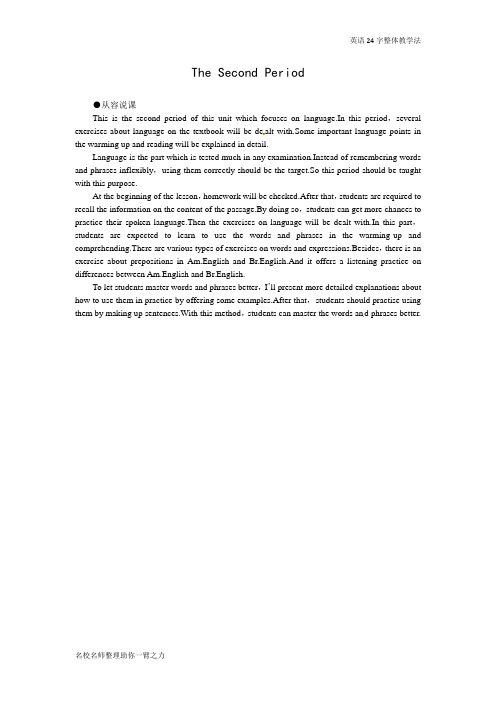
The Second Period●从容说课This is the second period of this unit which focuses on language.In this period,several exercises about language on the textbook will be de alt with.Some important language points in the warming up and reading will be explained in detail.Language is the part which is tested much in any examination.Instead of remembering words and phrases inflexibly,using them correctly should be the target.So this period should be taught with this purpose.At the beginning of the lesson,homework will be checked.After that,students are required to recall the information on the content of the passage.By doing so,students can get more chances to practice their spoken language.Then the exercises on language will be dealt with.In this part,students are expected to learn to use the words and phrases in the warming-up and comprehending.There are various types of exercises on words and expressions.Besides,there is an exercise about prepositions in Am.English and Br.English.And it offers a listening practice on differences between Am.English and Br.English.To let students master words and phrases better,I’ll present more detailed explanations about how to use them in practice by offering some examples.After that,students should practise using them by making up sentences.With this method,students can master the words an d phrases better.●三维目标1.Knowledge:Do some exercises to master words and phrases.2.Ability:Learn to use these words and phrases in daily life.3.Emotion:Train students perseverance and patience by remembering new words and phrases.●教学重点Explanation of words and phrases and practise using them.●教学难点How to let student master them well.●教具准备slides●教学过程Step 1 Greetings and revisionGreet the whole class as usual.T:Yesterday we learnt a passage and I asked you to finish the comprehending exercises.Who can tell me the answer?S:A,D,C,D,BT:Great!Now who can retell the content of the passage to us?S:Let me try.English is used more and more today.The number of the people speaking it is increasing rapidly.China has the biggest number of English speakers.However,even two native speakers do not speak the same English because there are many kinds of English.That is caused by communication of culture.So actually even they can not understand everything they say.Besides being spoken as the native tongue,English is also used as a foreign or 2nd language in many other countries.In a word,it is more and more important.Step 2 Learning about languageT:You did such a good job.You have mastered the text quite well.This period we will try to master the useful words and expressions in the first period.First let’s do exercise 1 in the part of learning about language.Please read the word or phrase and then match it with the right meaning.(Suggested answer:C D E F A B J G I H)T:Keep these words in mind.And then choose some of them to fill in the blanks in exercise 2.(suggested answer:native,actually,vocabulary,apartment,elevator)T:Now we’ll turn to a difficult one.You should fill in the blanks using the words from warming up and reading.At the same time,you’d better pay attention to the forms of the words.(Suggested answer:includes;culture;present;Actually;phrases;gas;international;rapidly;Actually;government)T:Well done!As we all know,there’re some differences between British English and American English.Can you give me some examples?S:(Ss can present their report on their research yesterday)Suggested examples about differences between Am.English and Br.English in spelling:American English British Englishneighborhoodlaborcolor honora blehumorfavoritetheater kilometermeterso mbercenter travelinglabeling canceling controledlicenseoffensepracticedefense organization neighbourhoodlabourcolour honourablehumourfavouritetheatrekilometremetresombrecentretravellinglabelling cancelling controlledlicenceoffencepractisedefence organisation(Suggested answers:In Am.English:on;on;of;on;from;on;In Br.English:in;at;to;into;at)T:Excellent.Just now you said that British and American English use different words to express the same meaning.Let’s move to exercise 5 and find out the different words that mean the same.S:sweets and candy;lorry and truck;autumn and fallT:So nice!No w please practise reading them in pairs,paying attention to the sentence stress and intonation.(Practice reading for a few minutes.)Step 3 Language pointsT:Then I’ll explain some useful words and expressions in warming-up and comprehending to you.1.include v.(never progressive)if one thing includes another,it has the 2nd thing as one of its parts.包含,包括e.g.The price includes dinner,beds,and breakfast.Durable goods includes such items as cars computers and electrical appliances.including prep.Included adj.(never before nouns)The bill came to $450,including tax.The bill came to $450,tax included.contain v.(never progressive)if sth. contain sth. else,it has that thing inside it or as part ofit.包含;含有;容纳e.g.This drink doesn’t contain any alcohol.There were four or five books containing toys and books.The information you need is contained in this report.container n.容器,集装箱2.play a role 扮演;起作用play (a role/part)as... in...在……中扮演……e.g.Monitor plays an important role in managing a class.The role he played as a hero in that movie won him many prizes.3.the number of... ……的数量(谓语动词为单数形式)a number of...大量的;修饰可数名词The number of homeless people has increased.Huge numbers of animals have died.A large number of problems have been raised.表示“许多”的词语归纳①只能修饰可数名词的有many,a good/great many,a (large/great)number of,many a (+n.)②只能修饰不可数名词的有much,a great/good deal of,a great amount of③可数和不可数均可修饰的有a lot of,lots of,plenty of,a large/great quantity of;quantities of4.even ifeven though 即使He didn’t take her advice,even though he knew it to be true.Even though he has got a good job,he still wants to look for a better one.5.not everythingnot与every,each,both,all,everything,everybody等连用为部分否定,全部否定用no one,none,neither,nothing,nobody,not any等。